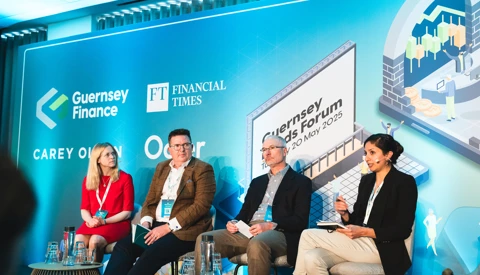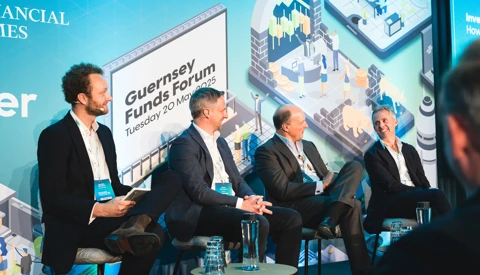The opening keynote to the Guernsey Funds Forum 2023. Presented by Michael Moore, Director General of the British Private Equity and Venture Capital Association (BVCA).
Transcript:
Tanya 00:00
The hike by the Bank of England is just yet another reminder that we are in the middle of quite a significant amount of economic turmoil at the moment. How will we see our way through it? Are we seeing our way through it? And also, are we at an inflection point? So as Rupert told you, the man who's going to explain all of that to us is Michael Moore, please welcome him.
Michael 00:30
A modest task you will agree to explain all that is going on as a backdrop to this. But Tanya, thank you for the introduction and Rupert and colleagues at Guernsey finance, real gratitude to you for the invitation and the opportunity to spend a bit of time with you. And congratulations. I want to be in the next planning session when you're looking ahead to your conferences with how you manage to navigate the coronation at one end of the week and avoid the rail strike at the other end of the week is pretty exceptional and special, and the BBCA would no doubt wish to tap into your foresight, if nothing else. But I assure you, there's lots else we love, working with Guernsey Finance about and the size and scale of the conference here today really underlines one of the key themes that I want to talk about in the broader range of industry context, which is where Guernsey now sits, having spent a long time building up its expertise now right at the heart of so much of What we do in the UK private capital industry, when you, as Tanya was saying, picked up the message in your smartphone, whatever it was that informed you of the well trailed increase in bank rates now to four and a half percent. It's just the latest in what has been a fairly challenging time over recent months, Set against a backdrop where, earlier in the month, the march, inflation figures released 10.1% again, going against expectations. People had hoped that we would now get out of double figures and be heading in a different direction. To hear the governor today make his later set of predictions about when things might get towards the 2% target that he has mandated to deliver one was at least able to realize that this might be a bit longer than we'd hoped for whether his predictions are any better than anybody else's is for academic study. But I think we can all get the fact that these are not straightforward times, and will continue to be so they're not isolated to the UK. Of course, we've had in the last year the crisis that has hit us as a consequence of the brutal invasion of Ukraine by Russia. And while sometimes that may not quite still dominate the headlines, although today's announcement of more weapons being deployed there by NATO countries will certainly remind us of the seriousness of it, the economic consequences, the social consequences of what has been going on there are only too real and how long that plays through in the energy markets, the volatility and uncertainty we've seen there or in other areas of life will is, again, still pretty hard to predict. Do we now just assume higher levels of energy for a longer time, while also looking at the energy transition, again, queries that all the smart people in industry will be working through and thinking about for some time to come and against that. Then this year, we had the moment of trauma when Silicon Valley Bank collapsed. That was a very bad moment for particularly the venture capital end of our industry. Although private equity wasn't untouched by it, what was striking in the immediate moment of collapse was the way the Bank of England and others rightly attempted to give confidence to the markets and make this about bank stability, and basically saying this is not a Lehman Brothers moment, a point that we were making, like others over that weekend that ensued was, No, it isn't, perhaps, for the economy, it's right that we take every step needed to avoid a Lehman Brothers moment. But for the industry, it might have been given the concentration of deposits in SVB and the way in which SVB was integrated within the community very successfully and had built up a great position. Now the HSBC rescue, the efforts that were made by the government and others over that weekend were transferred. International, and we are pleased that we've been able to carry on with limited consequences. But as we saw in Switzerland and as we've seen in regional banking in the United States, the banking issues have been real, and when great titans like Jamie Dimon and others are talking about ongoing consequences in the United States. We will be paying attention to that for a while. So question four of us is, where does that impact on us, and how does the real economy's woes impact us in private capital, particularly private equity and venture capital, I want to step out of the immediate moment just to remind ourselves of the success of the industry over a very long period of time, like to see my predecessor enroll, Tim haymes here today in one of his many other roles that he now has in his new life. But Tim and my other predecessors have overseen a period of 40 years of the bbcas existence, and the industry has transformed from not quite a cottage industry. I'm not ever sure the original establishment of the BBCA was in a cottage industry, but the scale of the industry and what it does is unlike what it was then, and what Tim and now I have been dealing with a happy problem to have is the scale of the industry means that its impact on the real economy, in a very positive way, is very significant indeed. We concluded our report with EY recently, which estimates that there are 2.2 million jobs in the UK that are backed by business, by private equity and venture capital firms. 6% of GDP is attributed to those businesses, and by the time you factor in supply chain and consumer spending impacts, those numbers pretty well double. And at that scale, you get noticed, and rightly so, and for us, worried as we do. Worry as we do about the regulatory footprint. What is happening? There a lively discussion every time we're talking to our friends in Guernsey and elsewhere. For all of us, we need to understand that the way in which that license to operate develops is very much linked to the perception, or the reality of the public value which we create as an industry, and ensure that the reputation, the story of the industry, is well understood. Now we welcome the scrutiny because we think we've got a great story to tell, and we've got a great story to tell because of the work that each of you does. The focus here, rightly today is on Guernsey, but the links with the UK, the success of us all together, is hugely important. And in that context, can I just highlight some of the points that Rupert made before the capital flows from Guernsey to the UK, as it frontier estimated. That's nearly 42 billion pounds. That's a big chunk of what our industry does across the whole of the UK, and hugely significant both to Guernsey, but to all of us too. I speak with obviously an accent from north of the border. I spend my weekends back home with the family and down here during the week. I'm proud of the fact that actually, we are an industry that has a footprint in the UK, across every part of it, and working hand in glove with our partners on Guernsey too, the fact that Guernsey finance and all the different partners the regulator who's here today have worked so hard to establish the right flexible, simple regime for the industry to Rupert's points, before establishing world class standards in the context of the island, and ensuring that's matched with low regulatory costs, that's a neat trick to pull off all the time. The track record for Guernsey is clear, impressive, and I'm pretty confident, not least because of what who I see here today, that that is going to continue for the future, when we get people looking to the UK and saying, What will make us come to the UK now? What will make the difference? Why the UK? Why not somewhere on the continent and so on, we're making quite similar arguments to the ones that Rupert and colleagues are making, too, and the partnership between us really matters. It's about the predictability of what has been here. It's about the ease of doing business and making sure that remains a good calling card. It's about the pool of experience on our doorstep, whether it's Guernsey here in London or up north in leedswell, be this evening or for. Further north at home, near Edinburgh. If we don't continue to offer all of those important features of ease of doing business, the network effect of having the largest hub of private equity and venture capital expertise anywhere in the world outside the United States of America, we will be diminished. But the good news is that all the trends, we will publish an investment activity report for 2022 next week, all the trends remain robustly strong. I'm very conscious there are reflecting the economics of the wider world, some real issues for people to address, but for us as an industry, the partnership we have between the UK and Guernsey That, to me, underpins a private capital industry that has established its credentials is of significance on the island and across the UK and is set fair for the future. We will navigate some squalls that might even be slightly stormier than squalls in the coming months, but the contribution that private capital is making to the real economy, to communities the length and breadth of this country, is significant, and I am confident with our partnership with Rupert's colleagues at Guernsey Finance, but the wider Guernsey community, it is a success story that will continue to develop. Thank you.







